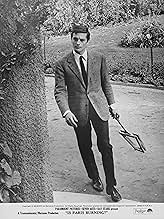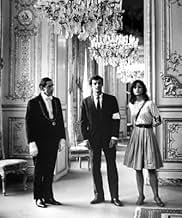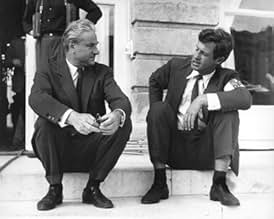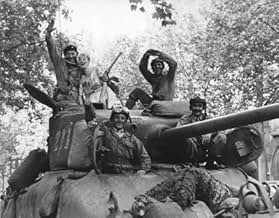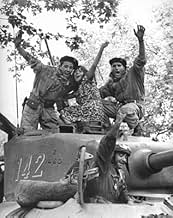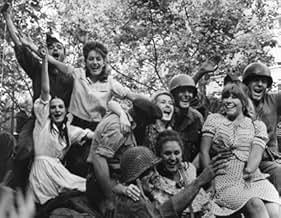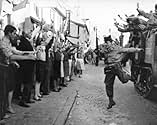VALUTAZIONE IMDb
6,8/10
5438
LA TUA VALUTAZIONE
La partenza dell'esercito tedesco da Parigi nel 1944.La partenza dell'esercito tedesco da Parigi nel 1944.La partenza dell'esercito tedesco da Parigi nel 1944.
- Regia
- Sceneggiatura
- Star
- Candidato a 2 Oscar
- 4 candidature totali
George Chakiris
- GI in Tank
- (as Georges Chakiris)
Gert Fröbe
- General Dietrich von Choltitz
- (as Gert Froebe)
Recensioni in evidenza
This film is a very well done dramatisation of the account of the liberation of Paris in August of 1944.History buffs take note;notice the mascot names of the tanks in General Leclerc's Free French armoured division.Many had Spanish names such as "Madrid" "Teruel" & "Zaragosa" as these vehicles were manned by anti-Fascist Spanish refugee fighters who played a largely important yet mostly un-acknowledged part largely ignored by mainstream historians about the WW2 period.
Although Hitler somehow survived the failed July assassination attempt his paranoia increased. One of the few high-ranking officers he felt he could still trust was Dietrich von Choltitz. He had served Hitler well and was an officer who could be relied upon to obey orders implicitly. Hitler appointed him Governor-General of Paris with instructions to restore order and if need be destroy Paris rather than let it fall into Allied hands. Every bridge and monument was mined. This and the general insurrection led by the French Communist Party combined to make this a momentous and perilous time in the history of the French capital. As the Allies approached, von Choltitz rescinded Hitler's order. Seventy-five years on it is almost impossible to appreciate just how close Paris came to total destuction.
These events should, in theory anyway, provide sufficient material for a first-class movie, especially with René Clément at the helm.
In reality alas the film is a dud. One can try and find reasons. Personally I think it is down to a variety of factors: at a little under three hours it rambles; the newsreel footage is far more interesting and thrilling than the filmed action; there is an irritating mish mash of accents with some decidedly dodgy dubbing; there are too many writers and far too many famous faces. One critic at the time observed that the flames were extinguished by the shower of stars! The performance that stands out is that of Orson Welles as Swedish Consul Raoul Nordling, an unsung hero whose diplomatic relationship with von Choltitz assuredly influenced the latter's thinking. This relationship is very well depicted in Volker Schloendorff's film 'Diplomacy' with Niels Arestrup and Andre Dussollier as General and Consul.
The scene that really packs a punch is the sight and sound of the bell of Notre Dame which had been silenced for over four years. This is especially poignant in light of the recent fire that engulfed this monumental edifice. Clement has also included a rendition of 'La Marseillaise' which never fails to move. Needless to say the film was a tremendous success in France and Maurice Jarre's rather hurdy-gurdy 'Paris Waltz' theme extremely popular in its own right. Big budget plus well known actors equals great film? In this case decidedly not. Strange indeed that 'The Longest Day' which had no less than five directors, seems to work better than this with just the one. The real star of course is Paris itself.
These events should, in theory anyway, provide sufficient material for a first-class movie, especially with René Clément at the helm.
In reality alas the film is a dud. One can try and find reasons. Personally I think it is down to a variety of factors: at a little under three hours it rambles; the newsreel footage is far more interesting and thrilling than the filmed action; there is an irritating mish mash of accents with some decidedly dodgy dubbing; there are too many writers and far too many famous faces. One critic at the time observed that the flames were extinguished by the shower of stars! The performance that stands out is that of Orson Welles as Swedish Consul Raoul Nordling, an unsung hero whose diplomatic relationship with von Choltitz assuredly influenced the latter's thinking. This relationship is very well depicted in Volker Schloendorff's film 'Diplomacy' with Niels Arestrup and Andre Dussollier as General and Consul.
The scene that really packs a punch is the sight and sound of the bell of Notre Dame which had been silenced for over four years. This is especially poignant in light of the recent fire that engulfed this monumental edifice. Clement has also included a rendition of 'La Marseillaise' which never fails to move. Needless to say the film was a tremendous success in France and Maurice Jarre's rather hurdy-gurdy 'Paris Waltz' theme extremely popular in its own right. Big budget plus well known actors equals great film? In this case decidedly not. Strange indeed that 'The Longest Day' which had no less than five directors, seems to work better than this with just the one. The real star of course is Paris itself.
Director Rene Clement brings together the finest French, American and German actors of the 1960s for a rather muddled historical epic. Released in 1966, "Is Paris Burning?" is a rather mixed bag of historical drama and confusion.
In August, 1944, the Allies are closing in on Paris. Hitler (Billy Frick) orders General von Cholitz (Gert Frobe, "The Longest Day") to take command and burn the city to the ground to prevent its capture. French resistance forces within the city won't permit this to happen, and Swedish consul Nordling (Orson Welles, "The Battle of Austerlitz") convinces Choltitz to make multiple concessions, allowing the resistance to make significant gains and hold on until the armed forces arrive.
The all-star cast is uniformly good, although many of the American stars have little to do. Gert Frobe is the real star of the piece. As Cholitz, he makes a strong and sympathetic character. Cholitz has to make important, difficult decisions on one hand, he's concerned about his men's safety; on the other, he is trying to follow orders. Welles is somewhat engaging, but he disappears partway through the film without leaving a lasting impression. The script, by Francis Ford Coppola and Gore Vidal, combines several stories, allowing the host of characters little time to do much of anything. Gallois (Pierre Vaneck) and Dr. Monod (Charles Boyer) try to break out of Paris and reach the Allies; Colonel Rol (Bruno Cremer) and Chaban (Alain Delon) organize the resistance forces; Nordling and tries to free Francoise Labe's (Leslie Caron, "Father Goose") husband from a POW camp. It's hard for any of these subplots to make much on an impact, but like "The Longest Day" and "Battle of Britain", the characters are kept distinct enough that they are easy to follow, despite major time lapses between appearances.
The German characters are portrayed by a host of familiar character-actors. Helmuth Schneider ("The Dirty Heroes") plays a Sergeant who throws a pessimistic Corporal (Otto Stern, "Commandos") into a detention cell; Gunter Meisner ("The Bridge at Remagen") is his usual, evil self as an SS Officer in charge of a prison train; Joachim Hansen ("The Eagle has Landed") is a moral officer who tries to help Nordling gain concessions; Wolfgang Preiss ("Von Ryan's Express") has little to do as the commander of a demolition squad; and Karl-Otto Alberty ("Battle of the Bulge") is an SS officer. The American actors tend to have clunky cameos: Kirk Douglas ("In Harm's Way"); Glenn Ford ("Casablanca Express"); Robert Stack and E.G. Marshall are all limited to one or two scenes. Anthony Perkins ("Catch-22") and Skip Ward make more of an impression as infantrymen waiting to liberate Paris.
Clement handles every shot brilliantly. There are several standout scenes. One sequence has partisans ambush a German armored car. One soldier escapes, still smoldering from burns from an exploded Molotov cocktail. He proceeds to hijack a passing French car and make the driver take him to HQ, where his gruesome burns alert the neat-and-clean officers that something is not right in the city. The scene in which Francoise Labe searches for her husband amongst a throng of prisoners in especially moving, and the conclusion is brilliant and unexpected. In another scene, a French squad occupied an old woman's apartment to fire on a German barricade, as the old woman watches while preparing herself a cup of tea. In another scene SS officers arrive to secure a painting for Hitler's birthday from the Louvre, before Frobe burns down the city. Frobe informs them that the Louvre is in French hands, and they reply "But it's right across the street!" Without missing a beat, Frobe tells them to take a white flag over and see if the French will let them in. This grim humor and wit add to the human story within the big picture.
A lot of attention to historical accuracy and detail went into the film's production. Costumes, from French civilian dress to military uniforms are all accurate. The exteriors are beautifully shot in and around Paris, often with excellently staged wide shots showing off the narrow streets and just how vast and battleground was. The scenes of the French resistance gathering in the streets to march on the Police Station, set to Maurice Jarre's thundering, jovial score, are most memorable. The spirit of revolution and joy of liberation is so well-portrayed that you can feel it with the characters on screen.
"Is Paris Burning?" suffers from annoyingly bad dubbing, overlength and a lack of focus, but these are nicks in any epic film, and cannot be avoided in order to tell such a vast story. As its heart, "Is Paris Burning?" is a fine movie about human freedom, told with brilliance and gusto.
In August, 1944, the Allies are closing in on Paris. Hitler (Billy Frick) orders General von Cholitz (Gert Frobe, "The Longest Day") to take command and burn the city to the ground to prevent its capture. French resistance forces within the city won't permit this to happen, and Swedish consul Nordling (Orson Welles, "The Battle of Austerlitz") convinces Choltitz to make multiple concessions, allowing the resistance to make significant gains and hold on until the armed forces arrive.
The all-star cast is uniformly good, although many of the American stars have little to do. Gert Frobe is the real star of the piece. As Cholitz, he makes a strong and sympathetic character. Cholitz has to make important, difficult decisions on one hand, he's concerned about his men's safety; on the other, he is trying to follow orders. Welles is somewhat engaging, but he disappears partway through the film without leaving a lasting impression. The script, by Francis Ford Coppola and Gore Vidal, combines several stories, allowing the host of characters little time to do much of anything. Gallois (Pierre Vaneck) and Dr. Monod (Charles Boyer) try to break out of Paris and reach the Allies; Colonel Rol (Bruno Cremer) and Chaban (Alain Delon) organize the resistance forces; Nordling and tries to free Francoise Labe's (Leslie Caron, "Father Goose") husband from a POW camp. It's hard for any of these subplots to make much on an impact, but like "The Longest Day" and "Battle of Britain", the characters are kept distinct enough that they are easy to follow, despite major time lapses between appearances.
The German characters are portrayed by a host of familiar character-actors. Helmuth Schneider ("The Dirty Heroes") plays a Sergeant who throws a pessimistic Corporal (Otto Stern, "Commandos") into a detention cell; Gunter Meisner ("The Bridge at Remagen") is his usual, evil self as an SS Officer in charge of a prison train; Joachim Hansen ("The Eagle has Landed") is a moral officer who tries to help Nordling gain concessions; Wolfgang Preiss ("Von Ryan's Express") has little to do as the commander of a demolition squad; and Karl-Otto Alberty ("Battle of the Bulge") is an SS officer. The American actors tend to have clunky cameos: Kirk Douglas ("In Harm's Way"); Glenn Ford ("Casablanca Express"); Robert Stack and E.G. Marshall are all limited to one or two scenes. Anthony Perkins ("Catch-22") and Skip Ward make more of an impression as infantrymen waiting to liberate Paris.
Clement handles every shot brilliantly. There are several standout scenes. One sequence has partisans ambush a German armored car. One soldier escapes, still smoldering from burns from an exploded Molotov cocktail. He proceeds to hijack a passing French car and make the driver take him to HQ, where his gruesome burns alert the neat-and-clean officers that something is not right in the city. The scene in which Francoise Labe searches for her husband amongst a throng of prisoners in especially moving, and the conclusion is brilliant and unexpected. In another scene, a French squad occupied an old woman's apartment to fire on a German barricade, as the old woman watches while preparing herself a cup of tea. In another scene SS officers arrive to secure a painting for Hitler's birthday from the Louvre, before Frobe burns down the city. Frobe informs them that the Louvre is in French hands, and they reply "But it's right across the street!" Without missing a beat, Frobe tells them to take a white flag over and see if the French will let them in. This grim humor and wit add to the human story within the big picture.
A lot of attention to historical accuracy and detail went into the film's production. Costumes, from French civilian dress to military uniforms are all accurate. The exteriors are beautifully shot in and around Paris, often with excellently staged wide shots showing off the narrow streets and just how vast and battleground was. The scenes of the French resistance gathering in the streets to march on the Police Station, set to Maurice Jarre's thundering, jovial score, are most memorable. The spirit of revolution and joy of liberation is so well-portrayed that you can feel it with the characters on screen.
"Is Paris Burning?" suffers from annoyingly bad dubbing, overlength and a lack of focus, but these are nicks in any epic film, and cannot be avoided in order to tell such a vast story. As its heart, "Is Paris Burning?" is a fine movie about human freedom, told with brilliance and gusto.
This film was a notorious turkey in 1966, but thanks to the recent DVD release it can be re-evaluated. It still doesn't come anywhere near classic status, but now we can see it in a format at least a little closer to how it should have been seen in the first place.
First, the dubbing -- the original theatrical release, which is the version released on VHS, is the single greatest case for subtitles in the history of film. It was execrable. On DVD, in French with English subtitles, the rhythms of the language are preserved and the distraction of having lip movement and the soundtrack so totally at odds with each other is gone. Unfortunately, the French track runs through the sequences featuring American stars, and that's a little disconcerting (though the French actor who dubbed Orson Welles does a very good Orson Welles impression). The solution of switching language tracks is inelegant, but useful. And there is no German track for the sequences featuring Gert Frobe. A better solution would have been to go the route of THE LONGEST DAY and run each sequence in the appropriate language with appropriate subtitles, but this film did not have a Darryl F. Zanuck producing it, willing to make those hard choices.
Second -- the screen format. Again, the VHS release was not letterboxed, and many of the shots and sequences demand the 2.35:1 ratio, particularly in the shots when the Resistance raises the French flag over the Prefecture of Police and Notre Dame. The VHS version is like going to Paris and looking at everything you see through a cardboard toilet paper tube.
What they couldn't do anything about in the DVD release was the "all-star" American actor casting. Kirk Douglas looks nothing like George Patton, and they made no effort to even try. Glenn Ford could have looked more like Omar Bradley with a little more attention to makeup, but when you're only in a couple of shots, and maybe working a couple of days, hey, why bother, right? At least with Orson Welles as Nordling and Robert Stack as Sibert we don't have the baggage of comparing a historic image to the image of the actor.
The biggest complaint about this movie was that it was confusing -- well, yes, but they were confusing times, which this movie brings out very well. But to the French a lot of the characters like Colonel Rol and General Leclerc are legendary. No real explanation of who they were and what they did is needed, like Patton would be to an American audience. So you really do have to know some of the background already. But for an American audience it is a lot easier if you don't try to keep straight who's who among the Resistance as long as you get the point, which IS clear, that there were several groups at odds with each other in the days before the Liberation and finally they were able to force the hand of the Allied generals and get them to change their strategy.
This film is basically a victim of American ethnocentrism. As an illustration: a while back I was visiting England not long after the film version of ALL THE PRESIDENT'S MEN had been released, and it was shown on the flight over. At one point while I was there I was discussing the film with our English hosts, and they made the telling point that they never could understand what all the fuss about Watergate was about anyway. In Great Britain, a simple vote of no confidence would have been put to Parliament and the government would have been turned out in a Knightsbridge minute. In IS PARIS BURNING?, Americans have no idea of what Nordling (Orson Welles) is talking about when he asks the German General Choltitz (Gert Frobe) if he is prepared to take the responsibility for destroying a thousand years of culture, and mentions Notre Dame and Sainte-Chappelle. We all know Notre Dame (or think we do, hunchbacks and all that), but Sainte-Chappelle? Ay, there's the rub. Most Americans don't know that Sainte-Chappelle is the absolute jewel of High Gothic (13th century) architecture. Where Notre Dame is imposing and overwhelming, Sainte-Chappelle is elegant and delicate. And most Americans are not aware that Choltitz is one of the most interesting figures of the war. He had a reputation for being a very efficient destroyer of cities, which is why Hitler gave him the job in the first place -- Rotterdam is not mentioned in the film, though Stalingrad is -- but his face-to-face interview with Hitler when he was given the assignment for Paris convinced him that Hitler had completely lost his mind. His disobedience of the Fuhrer's order meant he was shunned by Wehrmacht veterans after the war, but he saved Paris.
But if you forget the "hey-there" stunt casting ("Hey there, it's Kirk Douglas! Hey there, it's Orson Welles!") and forget trying to identify every single character in every single plot thread, and instead view Paris itself as the central character around which everything else revolves, then IS PARIS BURNING? can be a very rewarding film.
Paul Wilson, Theatre Department, Methodist College, Fayetteville, NC
First, the dubbing -- the original theatrical release, which is the version released on VHS, is the single greatest case for subtitles in the history of film. It was execrable. On DVD, in French with English subtitles, the rhythms of the language are preserved and the distraction of having lip movement and the soundtrack so totally at odds with each other is gone. Unfortunately, the French track runs through the sequences featuring American stars, and that's a little disconcerting (though the French actor who dubbed Orson Welles does a very good Orson Welles impression). The solution of switching language tracks is inelegant, but useful. And there is no German track for the sequences featuring Gert Frobe. A better solution would have been to go the route of THE LONGEST DAY and run each sequence in the appropriate language with appropriate subtitles, but this film did not have a Darryl F. Zanuck producing it, willing to make those hard choices.
Second -- the screen format. Again, the VHS release was not letterboxed, and many of the shots and sequences demand the 2.35:1 ratio, particularly in the shots when the Resistance raises the French flag over the Prefecture of Police and Notre Dame. The VHS version is like going to Paris and looking at everything you see through a cardboard toilet paper tube.
What they couldn't do anything about in the DVD release was the "all-star" American actor casting. Kirk Douglas looks nothing like George Patton, and they made no effort to even try. Glenn Ford could have looked more like Omar Bradley with a little more attention to makeup, but when you're only in a couple of shots, and maybe working a couple of days, hey, why bother, right? At least with Orson Welles as Nordling and Robert Stack as Sibert we don't have the baggage of comparing a historic image to the image of the actor.
The biggest complaint about this movie was that it was confusing -- well, yes, but they were confusing times, which this movie brings out very well. But to the French a lot of the characters like Colonel Rol and General Leclerc are legendary. No real explanation of who they were and what they did is needed, like Patton would be to an American audience. So you really do have to know some of the background already. But for an American audience it is a lot easier if you don't try to keep straight who's who among the Resistance as long as you get the point, which IS clear, that there were several groups at odds with each other in the days before the Liberation and finally they were able to force the hand of the Allied generals and get them to change their strategy.
This film is basically a victim of American ethnocentrism. As an illustration: a while back I was visiting England not long after the film version of ALL THE PRESIDENT'S MEN had been released, and it was shown on the flight over. At one point while I was there I was discussing the film with our English hosts, and they made the telling point that they never could understand what all the fuss about Watergate was about anyway. In Great Britain, a simple vote of no confidence would have been put to Parliament and the government would have been turned out in a Knightsbridge minute. In IS PARIS BURNING?, Americans have no idea of what Nordling (Orson Welles) is talking about when he asks the German General Choltitz (Gert Frobe) if he is prepared to take the responsibility for destroying a thousand years of culture, and mentions Notre Dame and Sainte-Chappelle. We all know Notre Dame (or think we do, hunchbacks and all that), but Sainte-Chappelle? Ay, there's the rub. Most Americans don't know that Sainte-Chappelle is the absolute jewel of High Gothic (13th century) architecture. Where Notre Dame is imposing and overwhelming, Sainte-Chappelle is elegant and delicate. And most Americans are not aware that Choltitz is one of the most interesting figures of the war. He had a reputation for being a very efficient destroyer of cities, which is why Hitler gave him the job in the first place -- Rotterdam is not mentioned in the film, though Stalingrad is -- but his face-to-face interview with Hitler when he was given the assignment for Paris convinced him that Hitler had completely lost his mind. His disobedience of the Fuhrer's order meant he was shunned by Wehrmacht veterans after the war, but he saved Paris.
But if you forget the "hey-there" stunt casting ("Hey there, it's Kirk Douglas! Hey there, it's Orson Welles!") and forget trying to identify every single character in every single plot thread, and instead view Paris itself as the central character around which everything else revolves, then IS PARIS BURNING? can be a very rewarding film.
Paul Wilson, Theatre Department, Methodist College, Fayetteville, NC
In August 1944, Adolf Hitler assigns General Dietrich von Choltitz (Gert Froebe) to be in the military governor of Paris and to burn the city in case of the Allied forces arrival. Meanwhile, the French resistance has internal fights of the different factions and leaderships. One French major convinces the Allied forces to liberate Paris from the Germans. General von Choltitz disobeys Hitler's orders and spares Paris from destruction.
"Paris brûle-t-il?", a.k.a. "Is Paris Burning?", is an underrated French super production about the liberation of Paris in World War II. It is impressive the number of stars in this movie, directed by René Clément; screenplay by Francis Ford Coppola; music by Maurice Jarre. There are many cameos of great actors and also a huge number of bit players. Unfortunately the dubbing in English is awful. Fortunately this German general did not destroy one of the most beautiful cities in the world. My vote is eight.
Title (Brazil): "Paris Está em Chamas?" ("Is Paris Burning?")
"Paris brûle-t-il?", a.k.a. "Is Paris Burning?", is an underrated French super production about the liberation of Paris in World War II. It is impressive the number of stars in this movie, directed by René Clément; screenplay by Francis Ford Coppola; music by Maurice Jarre. There are many cameos of great actors and also a huge number of bit players. Unfortunately the dubbing in English is awful. Fortunately this German general did not destroy one of the most beautiful cities in the world. My vote is eight.
Title (Brazil): "Paris Está em Chamas?" ("Is Paris Burning?")
Lo sapevi?
- QuizOne of the main reasons for the movie being filmed in black and white: the French authorities refused to allow red and black Nazi flags to fly in Paris, even for a movie. They agreed only to the use of black and gray Nazi flags.
- BlooperJudging by Choltitz's own memoirs ('Soldat enter Soldaten", 1951) there never was an order to deliberately destroy Paris or its monuments. The orders concerned laming industrial plants, blowing bridges, crushing uprisings, and defending the town as a fortress, accepting collateral damage. Choltitz later found out these orders were addressed to his superiors, not to him. He does mention Hitler asking "Is Paris burning?" but says he was informed of this by others, whose names he does not give.
- Citazioni
Lieutenant Henri Karcher: [over the phone to his father] Hello, Papa? This is Lieutenant Karcher. Your son. In spite of your pessimstic view of my military career, I'd like to announce I've just made some prisoners of the general in command of Paris at the Hotel Meurice. He surrendered to me. But I'm still very bad at drill.
- Curiosità sui creditiThe end credit sequence is in color.
- ConnessioniFeatured in Il mago - L'incredibile vita di Orson Welles (2014)
I più visti
Accedi per valutare e creare un elenco di titoli salvati per ottenere consigli personalizzati
- How long is Is Paris Burning??Powered by Alexa
Dettagli
- Data di uscita
- Paesi di origine
- Lingue
- Celebre anche come
- Is Paris Burning?
- Luoghi delle riprese
- Rue de la Huchette, Paris 5, Parigi, Francia(barricades)
- Aziende produttrici
- Vedi altri crediti dell’azienda su IMDbPro
- Tempo di esecuzione
- 2h 55min(175 min)
- Colore
- Proporzioni
- 2.35 : 1
Contribuisci a questa pagina
Suggerisci una modifica o aggiungi i contenuti mancanti

![Guarda Bande-annonce [OV]](https://m.media-amazon.com/images/M/MV5BOWYyYzkwZTEtOTI4YS00NzFjLWI0ZmYtM2E1N2RiYTk2ZmNkXkEyXkFqcGdeQXRyYW5zY29kZS13b3JrZmxvdw@@._V1_QL75_UX500_CR0)
